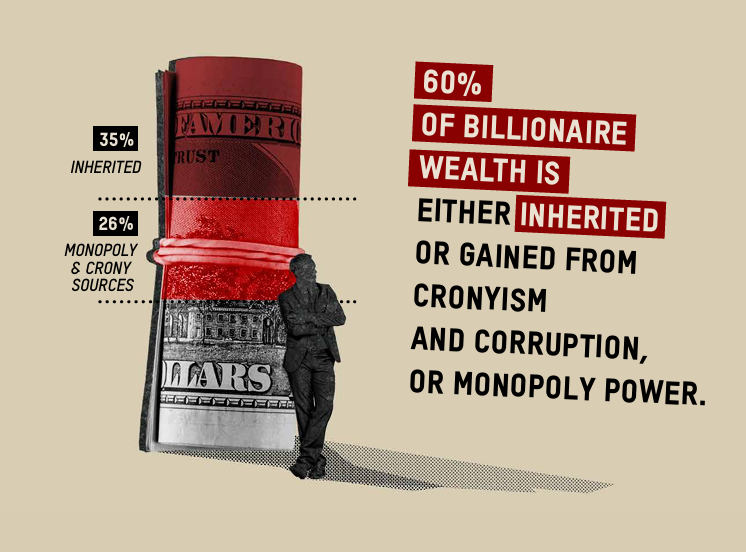Kathmandu. As some of the world’s political and financial elites prepare for their annual gathering in Davos, Switzerland, a leading anti-poverty group released a report on Monday showing that billionaire wealth will grow three times faster in 2024 than the previous year.
In its latest assessment of global inequality, Oxfam International, which is due to open its World Economic Forum meeting, predicted that at least five trillionaires will emerge in the next decade. A year ago, the group had predicted that there would be just one trillionaire in that time. Oxfam’s research reinforces outgoing President Joe Biden’s warning last week of a “dangerous concentration of power in the hands of a few ultra-rich individuals.”

The group’s scathing report, “Takers Not Makers,” also found that the number of people living in poverty has barely changed since 1990. The World Economic Forum expects about 3,000 attendees, including business executives, academics, government officials and civil society leaders, to attend its annual meeting in the Alpine village of Davos. – What’s the worry? … ‘New oligarchy’ – President-elect Donald Trump, who has visited Davos twice in his first term and is set to be sworn in on Monday, is expected to participate in the forum via video on Thursday.
He has long advocated for wealth accumulation, including himself, and counts billionaire Elon Musk as a key advisor. “What you’re seeing now is a billionaire president being sworn in today with the support of the richest man in the world. So this is the crown jewel of the global elite,” said Amitabh Behar, executive director of Oxfam International, in an interview, referring to Trump and Musk. “This is not about one particular person.

This is an economic system that we have created where billionaires are now able to shape economic policies, social policies, which ultimately give them more and more profit.” Global advocacy group Oxfam has called on governments to tax the richest and “dismantle the new aristocracy” to reduce inequality and excess wealth, echoing Biden’s call for billionaires to “start paying their fair share” through the US tax code.
The group has called for measures such as breaking up monopolies, capping CEO pay and regulating corporations to ensure workers are paid a “living wage.” – How are the poorest faring? – Many investors have seen strong gains in 2024, driven by strong performances for top tech companies and stock-market indices such as the S&P 500, as well as the price of gold and cryptocurrencies such as bitcoin.
Billionaires’ wealth increased by $2 trillion last year, according to Oxfam. This is three times more than in 2023 and is $5.7 billion per day. The number of billionaires has increased by 204 to 2,769, and the wealth of the 10 richest people has increased by an average of about $100 million per day.
The group, citing World Bank data, said the number of people living on less than $6.85 a day has “hardly changed” since 1990, pointing to persistent poverty. Oxfam used Forbes’ real-time billionaire list as of the end of November to calculate the ultra-rich.
By contrast, at least four new billionaires became ‘super-rich’ every week in 2024, and three-fifths of billionaire wealth comes from inheritance, monopoly power or ‘crony connections’. On average, Oxfam says low- and middle-income countries spend about half of their national budgets on debt repayments.
The group also said life expectancy in Africa is below 64 years, compared to over 79 years in Europe. – Will it be business as usual again at Davos this year? – Despite the growing gap between the super-rich and the poor, with strong leaders emerging in some Western countries and progressive issues such as diversity and climate change weakening in the business world, the annual Davos conference, which officially opens on Tuesday, is likely to focus on making money and making deals again this year.
The continued rise of artificial intelligence as a tool for businesses to become more efficient will also be a central theme in Davos, despite concerns that AI could upend many white-collar jobs in many sectors and displace workers across a range of industries. Trump’s return to a second term is likely to be a topic of much debate in Davos. Also on the agenda will be ongoing conflicts, including the wars in Ukraine and Sudan, and hopes for a ceasefire between Hamas and Israel that began on Sunday, halting their devastating 15-month war in Gaza.

The forum’s organizers released a survey of 900 experts last week called for a “Global Risks Report.” The report found that conflict between countries was the biggest concern, followed by extreme weather, economic conflict, misinformation and disinformation, and “social polarization” – a sign of the gap between rich and poor. As in previous years, protesters took to the streets calling for greater economic equality, taxes on the wealthy and other demands. Some blocked roads in Davos, disrupting traffic in some places and delaying the travel of some participants to the event, which runs until Friday.





























प्रतिक्रिया दिनुहोस्